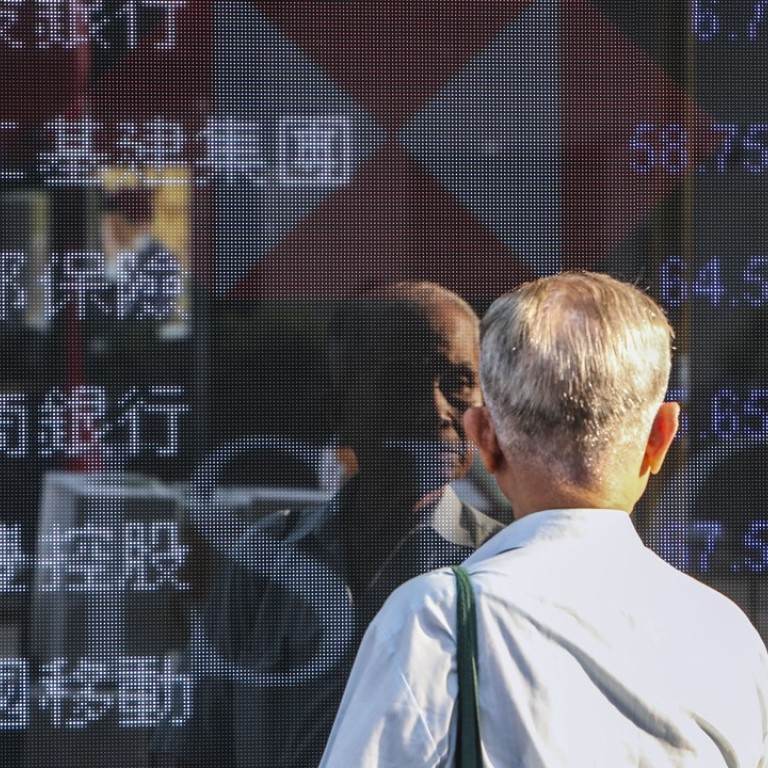
Hong Kong stocks wipe out all Monday’s gains as effect of Beijing policy pledges wears off
- The Hang Seng Index ends down 3.1 per cent; The Shanghai Composite retreats 2.3 per cent; The Shenzhen Composite Index loses 2.2 per cent
Hong Kong’s benchmark stock index lost more than 800 points on Tuesday, erasing all of Monday’s gains, as a short-lived rally in the Chinese market fizzled out and a sharp drop in US futures indicated deeper losses to come on Wall Street.
The Hang Seng Index closed down 806.60 points, or 3.1 per cent, at 25,346.55.
On Monday, it had advanced 591.75 points, or 2.3 per cent, after mainland Chinese stocks posted their biggest jump in two and half years brought about by a flurry of support measures from Beijing to boost confidence in the economy and the market. The percentage gain was the biggest single-day increase for the gauge in a month.
“We knew the gains on Monday were temporary, but nobody expected the policy effect to fade out so soon,” said Castor Pang Wai-sun, head of research at Core Pacific-Yamaichi Financial Group.
“For now the market is not convinced the policies will actually help the economy, and investors are rushing to take profits and leave.”
Ryan Chan, an associate director for Eddid Securities and Futures, said China’s support measures have briefly boosted confidence, because they offer a short-term solution to the liquidity issue facing small-to-medium-sized businesses.
“But concerns about the underlying issues behind the economic slowdown are still there, including weakening exports and sluggish retail growth,” Chan said.
Alvin Cheung, associate director at Prudential Brokerage, said the profit-taking on the Hong Kong market is “reasonable”, as the macro backdrop of a deteriorating US-China relationship hasn’t changed.
CLSA analysts Alexious Lee and Cara Liu wrote in a note on Monday that the steep correction of the last two weeks indicated the A-share market is in “panic mode”.
Investors are cutting their positions because they expect margin calls from pledged shares in small companies to spill over to larger firms on the main board.
Around 40 to 45 per cent of private companies’ shares in the Nasdaq-style ChiNext Index are pledged as collateral for loans, and the ratio could rise as high as 50 per cent in 2019, according to the report.
Casino operator Galaxy Entertainment and developer China Resources Land were the biggest losers among blue-chip stocks, sinking 8 per cent and 6.6 per cent respectively.
The Hang Seng China Enterprises Index, known as the H-shares index, retreated 2.4 per cent, or 255.77 points, to 10,234.90.
Turnover on the main board shrank 15 per cent to HK$97 billion from Monday.
On the mainland, the benchmark Shanghai Composite Index also pulled back after Monday’s 4.1 per cent rally, closing 2.3 per cent lower at 2,594.83.
On the tech-heavy Shenzhen exchange, the Composite Index fell 2.2 per cent, the Component Index lost 1.9 per cent, and the ChiNext start-up board finished 1.7 per cent lower.
Chinese liquor makers led the decline on the back of proposed public health legislation to strengthen education to prevent excessive drinking. Jiangsu Yanghe Brewery tumbled 9.6 per cent to 109.90 yuan, and Anhui Kouzi Distillery fell 8.2 per cent to 42.20 yuan.
Shares of securities brokerages bucked the trend and traded higher, extending the rally from Monday. Nanjing Securities surged 10 per cent to 8.54 yuan and Industrial Securities climbed 7.5 per cent to 4.75 yuan.
The overall drop in mainland China’s shares came after US stock futures fell sharply in Asian trading hours. Futures for the Dow Jones Industrial Average, the S&P 500, and the Nasdaq Composite all fell by more than 1 per cent.
Elsewhere in Asia, leading markets posted a broad retreat on Tuesday. Japan’s Nikkei 225 closed down 2.7 per cent, South Korea’s Kospi dropped 2.6 per cent, and Taiwan’s Taiex fell 2 per cent. Australia’s S&P/ASX 200 lost 1.1 per cent.
On Monday, the Dow Jones Industrial Average and the S&P 500 ended down 0.5 per cent and 0.4 per cent respectively, as financial and energy shares were weak. The Nasdaq rose 0.3 per cent as technology stocks fared better.


